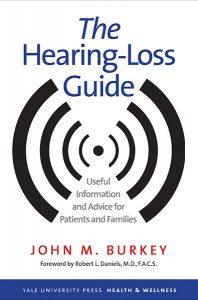Ten Steps to Help a Loved One Who Has Hearing Loss
John M. Burkey—
“How can I help?” is a common refrain from family and friends of a person with hearing loss. Spouses want to alleviate their partner’s struggles and frustration. Children want to prevent an aging parent’s autonomy from being affected. Acquaintances of all kinds want to improve communication not only for the benefit of the person with hearing loss but for themselves as well.
Fortunately there are steps a person can take to help a loved one with hearing loss. The steps are not difficult but may require a little hand holding. Those willing to follow these steps will find it worth the effort. Start at the beginning and go one at a time.
- Help the person recognize a hearing problem by pointing out when he or she struggles to hear what is easily audible for others. If everyone else can hear and understand what is said, the problem is not “mumbling.”
- Show your loved one how hearing loss is negatively affecting his or her quality of life. Call attention to the times he or she misses out on important or valued conversations, becomes frustrated or irritable at not hearing, or withdraws from social situations because listening is too difficult.
- Explain how the hearing loss also affects you. Describe in plain words how you become frustrated at constantly having to repeat, at the television being too loud, or at no longer having a partner willing to go to restaurants, parties, movies, church socials, and other activities where hearing might be a problem.
- Encourage the person to have the hearing checked (preferably an audiologist or ear, nose and throat doctor) and make it easy by providing the center’s contact information or by offering to schedule an appointment.
- Go with the person to the appointment and sit in during the discussion of results and recommendations. Make sure your loved one understands the findings and recommendations. Don’t hesitate to ask questions if something seems unclear.
- Regardless of whether surgery, medication, hearing aids, or something else is recommended, encourage the person to make use of the options available.
- Help your loved one recognize the benefit of the intervention so they stick with it. Point out that the television isn’t as loud, that fewer things are misunderstood, and that others don’t have to repeat as much.
- You can also help by speaking up slightly and speaking a little slower. Also be sure to talk towards the person and to reduce any competing background noise whenever possible. Note that this is not one of the first steps. If you always make up for the hearing loss, there may be less incentive for your loved one to do so.
- Help your loved one find and encourage him or her to use assistive devices that might be helpful such as an amplified or vibrating alarm clock, wireless headphones for the television, or an amplified or closed caption telephone. Devices such as these can usually be purchased online from websites such as ADCO Hearing Products, CapTel Captioned Telephone, Harris Communications, or HearMore.com.
- Educate yourself about hearing loss. Search the internet. Find books written for the layperson. Get advice from hearing impaired people you know. The more you learn about hearing loss, the better you can help your hearing impaired loved one.
John M. Burkey is the director of audiology at the Lippy Group for ENT in Warren, Ohio and author of The Hearing-Loss Guide: Useful Information and Advice for Patients and Families.



























